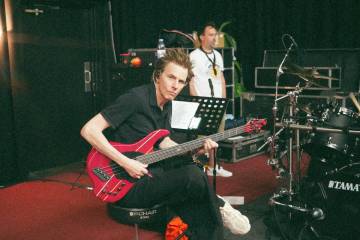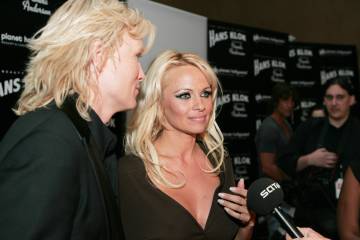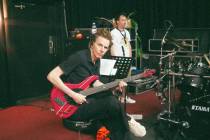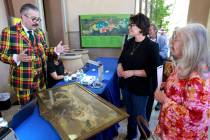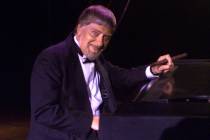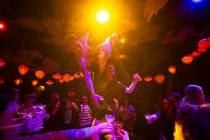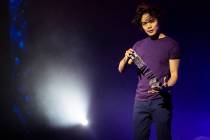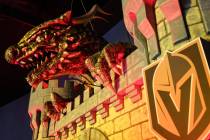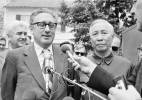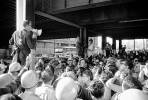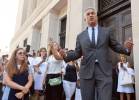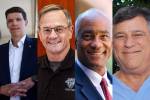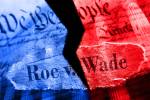Two local programs examine JFK’s life and death
It’s been one year beyond a half-century now, and the assassination of President John F. Kennedy still fascinates and mystifies, and even can still sadden, Americans.
The United States’ 35th president was killed on Nov. 22, 1963, maybe at the hand of Lee Harvey Oswald and, many Americans still believe, maybe not. But, by now, the assassination and the mysteries surrounding JFK’s death have moved beyond history to become a part of American pop culture.
This weekend, Southern Nevadans can explore JFK’s life and still-controversial death via two public programs.
On Saturday, JFK historian Walt Brown will present “10 Things You Didn’t Know About the JFK Assassination” at 7 p.m. at The Mob Museum, 300 Stewart Avenue. The program will include a question-and-answer session, and a book signing will follow. The event is included with museum admission and free for museum members, and reservations can be made by following the link from the museum’s Web page (www.themobmuseum.org).
Also on Saturday, “The JFK Exhibition,” a collection of JFK memorabilia, will open in the Pavilion inside the Tropicana. Hours are from 10 a.m. to 10 p.m. daily, and adult admission is $24.95, or $19.95 for local residents with IDs.
The exhibition, which runs through Jan. 3, will feature such items as clothing worn by first lady Jackie Kennedy, personal items used by JFK, a mock-up of the Oval Office, a Boeing 707 fuselage fashioned to resemble Air Force One, limousines used by Kennedy, and photos and audio recordings. Also on display will be items from the archives of the Greenspun Media Group and Las Vegas Sun about JFK’s links with Las Vegas. For tickets and more information, call 888-829-9034 or visit TropLV.com.
Jim Warlick, owner of the collection, has spent most of his life collecting presidential and political memorabilia. He grew up in a small North Carolina town and was sitting in his sixth-grade classroom on the day Kennedy was killed.
“The principal came in and told the teacher (JFK) had been shot,” Warlick recalls. “You’re young, you don’t really know. But even at that age, you knew something just occurred, much like 9/11 is for young people today.
“When I got home, we watched the TV for four days nonstop. I even saw Oswald killed on TV.”
Warlick says Kennedy and his untimely death helped to inspire an interest in politics. Warlick later went to Washington, D.C., and visited JFK’s gravesite.
As an adult, Warlick worked for a congressman in Washington, D.C., for a time before opening a memorabilia store there and, later, his American Presidential Museum in Branson, Mo. A few years ago, he began to take his collection on tour.
By the way: Warlick says the exhibit Southern Nevadans will see is focused more on JFK’s life than his assassination. “It’s very family-oriented.”
For those who do wish to explore JFK’s assassination in depth, Brown — whose JFK scholarship includes a 32,000-page chronology of Kennedy’s life and death and everything about it that has happened since — will offer a look at some of the things Americans still don’t know about the assassination.
Brown says he’s not a subscriber to the lone gunman theory, which holds that Oswald, acting alone, killed Kennedy. However, he also voices disdain for the more outlandish theories and the JFK assassination cottage industry that have arisen in the decades since.
One scenario that does seem possible to Brown: that Oswald was merely a cog in something bigger, “inside of something he didn’t understand.”
But, Brown says, “there has been just so much published, and the vast majority of it is rubbish — everyone from the Boy Scouts to the Little League to B’nai B’rith did it — and it gets very tiring.”
Brown, a former U.S. Justice Department agent, was a high school junior when Kennedy was killed. Brown was walking down the street when, he recalls, “a total stranger came up to me and said, ‘I don’t know if you’ve heard, but the president has been shot. It’s bad. He was shot in the head. They don’t know, but it’s bad.’ ”
Two blocks later, he noticed that a merchant had put a TV in his store’s window. All six local stations were covering the shooting, he recalls, and “the closest you could get to normal programming was, one channel was showing a movie of ‘PT 109.’ The next day there was a football game, and everybody hit and tackled like you were hitting Oswald.”
What’s behind our continuing interest in JFK’s assassination? The answer may include equal parts the young president’s charisma, a sort of nostalgia for the optimistic vibe Americans had during the early ’60s, and ultimately, a disillusionment and distrust of government and politicians that took root after the assassination.
When Kennedy came to office, there was, Warlick says, a sense of “potential in the air.”
Objectively speaking, Lyndon B. Johnson, Kennedy’s vice president and successor, “had more impact on America today in terms of public policy,” Warlick adds, “but I think it was John Kennedy’s potential that people feel was snuffed out.”
Even today, at the memorabilia stores Warlick owns in Washington and elsewhere, “we sell more John Kennedy (merchandise) than all the other presidents, by far. And foreign tourists — probably 30 (percent) to 40 percent of our customers are from overseas — it’s always John Kennedy.
“I think the youthfulness was very attractive. The time we came out of, the ’50s, it was kind of bland in a sense. It took off with Kennedy promising the moon — which he did — and there was just so much potential that was just snuffed out.”
It was, Brown says, “the charm, the handsomeness, the wit. When you stand John Kennedy next to (Dwight) Eisenhower, you can’t imagine one followed the other.”
When Kennedy was killed, Americans were startled that a president apparently could be killed by a single gunman. Eventually, their disappointment turned to disillusionment and, as they sought answers and found no answers, a general distrust of government.
Michael Green, a history professor at the University of Nevada, Las Vegas, says the fascination also was fed by how he died. “There’s an air of conspiracy about it, deserved and undeserved.”
Over the decades, wondering what history would have been like had JFK lived has turned Kennedy into an almost mythical figure. We forget, Green says, that “he was controversial.”
We forget that Adlai Stevenson, U.N. ambassador at the time, went to Texas not long before Kennedy and “was spat upon,” Green says. There were concerns about demonstrations during JFK’s visit, and “this was the time of the John Birch Society rising. We tend to forget that he was controversial. So there’s a combination of glorifying him beyond what he deserves and, you might say, a bit of penance, perhaps.”
Maybe, too, our fascination with JFK and his death reflects a longing for what seemed to be more simple political times when government worked, when Democrats and Republicans could work together, and when we trusted our political leaders, whether they were of our own party or not.
Since JFK’s assassination, there has been “a big segment of the population, liberal or conservative, depending on who’s in, who believe that government and presidents are not trustworthy,” Green says.
Another possibility for our continuing fascination with Kennedy’s death: People, Brown says, “love a mystery. The Kennedy assassination is a 52-week-a-year visit to a hotel where there’s a murder mystery, and you’ve got Col. Mustard in the billiards room with a candlestick.”
So what if all of our questions could be answered tomorrow? Would that be the end of it?
“That’s the crazy thing,” Brown answers. “I’ve been asked for 25 years, one, are you afraid? No. Two, will we ever know?
“My stock answer is, if the people who did this had a press conference on the 11 o’clock news (to say), ‘Here’s what we did and here’s how we did it,’ in three months there would be five books on the shelves saying they’re lying.”
That’s unfortunate, Brown says, because, even after 51 years, “there still hasn’t been justice for President Kennedy.”
Contact reporter John Przybys at jprzybys@ reviewjournal.com or 702-383-0280.






